The city of Grimholt breathed through its wounds.
Caleb Morrison felt it in the steering wheel beneath his palms—a subtle vibration that pulsed upward through the ambulance's frame, synchronizing with the streetlights that flickered in patterns too deliberate for mere electrical failure. The rain struck the windshield in geometric precision, each droplet finding its place in configurations that defied natural law. Through the passenger window to his right, the city's decay sprawled like a patient on an operating table, its arteries of broken concrete and rusted steel still pumping with an unnatural vitality.
Eight years of emergency calls had worn grooves in Caleb's perception, but tonight the familiar route felt different. The shadows between buildings seemed to shift with purpose, and the low-frequency hum that emanated from underground—the one longtime residents claimed not to hear—pressed against his eardrums with increasing insistence.
Marla Chen occupied the passenger seat three feet to his right, her weathered hands folded in her lap but her eyes constantly scanning the streets through her side window. At fifty-two, she carried the accumulated weight of a thousand emergency responses in the way her shoulders settled, in the practiced stillness of her breathing. Her reflection in the side mirror caught fragments of neon from the Nexus Healthcare billboards that lined the avenue—subtle corporate branding that had crept into every corner of the city's infrastructure like ivy through cracked mortar.
"Pull over here," Marla said, her voice cutting through the ambient hum that seemed to emanate from the asphalt itself.
Caleb guided the ambulance to the curb outside Sal's Diner, its flickering neon sign casting alternating shadows across the wet pavement. Through the diner's grease-stained windows, he could see the usual collection of night-shift workers hunched over coffee cups, their faces illuminated by the pale fluorescent glow that made everyone look corpse-pale.
The silence between them stretched for thirty seconds before Marla spoke again, her gaze fixed on something beyond the rain-streaked passenger window. "Tommy Reeves called me yesterday. You know Tommy—works maintenance at the Steel Works."
Caleb's hands remained on the steering wheel at ten and two, but his knuckles whitened slightly. The Steel Works sat like a tumor on Grimholt's industrial horizon, its smokestacks piercing the night sky two miles northwest of their current position. "What about Tommy?"
"Says the workers have been... different. Acting strange. Moving like they're sleepwalking, but still doing their jobs." Marla turned to face him, the movement shifting the leather seat beneath her. "And Nexus reps have been coming around. Weekly visits. Real quiet about it."
The mention of Nexus sent a familiar spike of heat through Caleb's chest—the same burning sensation that had consumed him three months ago when he'd discovered the truth about Sarah's medication. His sister had died on a Tuesday morning, her heart simply stopping as she prepared breakfast in her kitchen. The official cause: cardiac arrest brought on by an adverse reaction to her new medication. The unofficial cause: experimental Nexus compounds that had been substituted for her regular prescription when her government benefits expired.
Caleb's peripheral vision caught movement in his rearview mirror—a homeless man shuffling along the sidewalk behind them, his head tilted upward toward the rain. The man's lips moved in what appeared to be conversation with the geometric patterns of falling water, his weathered face etched with the kind of unease that came from seeing too much.
"Nexus owns half the ambulances in this city," Caleb said, his voice carrying the weight of accumulated suspicion. "Their logo's on our equipment, our protocols, probably our paychecks."
Marla's laugh held no humor. "Yeah, but this feels different. Tommy says they're not just observing anymore. They're... participating. Like they're running some kind of test."
The radio crackled to life, its static-filled voice cutting through their conversation like a blade. "Unit 7, domestic disturbance at 1-23 Elm Street. Possible injury. Respond Code 2."
Caleb reached for the radio handset, his fingers wrapping around the familiar weight of the device. "Unit 7 en route." He flipped the sirens on, and the ambulance's emergency lights painted the wet streets in alternating patterns of red and blue, the colors reflecting off puddles that had formed in shapes too perfect to be accidental.
The house at 1-23 Elm Street squatted in the darkness like a broken tooth, its windows glowing with the harsh fluorescent light that spilled from the interior. Two police cruisers sat at angles in the narrow driveway, their headlights creating intersecting cones of illumination that revealed a front yard littered with the detritus of urban decay—broken bottles, cigarette butts, and patches of grass that had grown in spiral patterns that hurt to look at directly. Caleb pulled the ambulance to a stop twenty feet behind the police cars, its engine ticking as it cooled in the night air. Through the house's front window, he could see figures moving in jerky, unnatural rhythms—police officers restraining someone who thrashed with mechanical precision, like a machine following a predetermined sequence of movements.
Marla was already reaching for her medical kit in the space between their seats. "Third domestic this week in this neighborhood," she said, her voice carrying the tone of someone connecting dots that formed an increasingly disturbing picture. "All with the same pattern—someone just snapping, hearing things that aren't there".
They approached the front door together, their footsteps splashing through puddles that reflected the emergency lights in patterns that seemed to pulse with their own internal rhythm. The door stood ajar, revealing a narrow hallway that stretched toward the back of the house, its walls covered in wallpaper that had begun to peel in geometric configurations.
Inside, the living room held a disturbing sight. A woman in her thirties sat on a threadbare couch in the center of the room, her left arm cradled against her chest while blood seeped through the makeshift bandage someone had fashioned from a kitchen towel. Ten feet to her right, two police officers flanked a man whose wild eyes darted between empty spaces in the air, his lips moving in whispered conversation with invisible presences.
"Ma'am, I'm Caleb, this is Marla," he said, kneeling beside the couch while maintaining visual contact with the restrained man. "Can you tell us what happened?" The woman's eyes focused on him with difficulty, as if she were looking through layers of thick glass. "He started hearing them around midnight. Voices, he said. Coming from the walls, from the rain outside. Then he just... went at me". Marla positioned herself on the woman's left side, her experienced hands already assessing the wound through the blood-soaked towel. "Deep laceration, but clean. We'll get you fixed up and to the hospital for proper stitches".
As they worked, Caleb's attention was drawn to the conversation between the two police officers stationed near the front window. Officer Martinez, a twenty-year veteran with graying temples, spoke in the measured tones of someone who had seen too much but couldn't quite process what he was witnessing. "Third one this week," Martinez said to his partner, a younger officer whose name tag read "Stevens". "Always the same pattern—hearing voices, losing touch with reality, then violence. Always in this same six-block radius". Stevens nodded, his eyes scanning the room's corners as if searching for hidden threats. "Something's definitely up. Dispatch says there's been a thirty percent increase in psychiatric emergencies in this district over the past month".
Caleb felt Marla's eyes on him—a brief, significant glance that confirmed she was processing the same information. The pattern was too consistent, too geographically concentrated to be coincidental. Something was happening in this neighborhood, something that made people hear voices and lose their grip on reality.
The restrained man suddenly looked directly at Caleb, his eyes focusing with startling clarity. "You hear them too," he said, his voice carrying an odd resonance that seemed to echo from multiple directions at once. "In the rain. In the lights. They're calling us home".
Before anyone could respond, the radio on Martinez's belt crackled to life with a burst of static that resolved into urgent dispatching instructions. "All units, Code Red at Grimholt Steel Works. Multiple casualties. Industrial accident with unknown hazardous materials. Respond immediately". Caleb's blood turned to ice water in his veins. The Steel Works—the same facility Marla had been asking about, the one with the strange worker behavior and the weekly visits from Nexus representatives. He caught Marla's eye across the couch, seeing his own realization reflected in her expression. "Unit 7 responding," he said into his radio, his voice steady despite the adrenaline surge that made his hands tremble slightly.
They completed their treatment of the woman in efficient, practiced movements—wound cleaning, bandaging, pain assessment—while the man continued his whispered conversation with the empty air. As they prepared to transfer her to the ambulance, Caleb noticed something that made his stomach clench with recognition. On the coffee table beside the woman's purse sat a small orange prescription bottle. Even from six feet away, he could see the distinctive Nexus Healthcare logo embossed on the label—the same logo that had been on Sarah's switched medication, the same corporate signature that seemed to appear wherever things went wrong in Grimholt.
The Grimholt Steel Works rose from the industrial wasteland like a mechanical cathedral, its smokestacks piercing the night sky while its vast bulk sprawled across twenty acres of contaminated earth. As Caleb guided the ambulance through the facility's main gate, the structure's true scale became apparent—a maze of interconnected buildings, conveyor systems, and processing towers that hummed with activity despite the late hour.
But something was fundamentally wrong with the scene before them. The gate, which should have been staffed by security personnel, hung open on its hinges as if something had forced it inward with tremendous effort. The guard booth stood empty, its windows reflecting the ambulance's headlights in patterns that seemed to shift and writhe. And despite the obvious signs of industrial activity—the glow of furnaces, the rhythmic hammering of machinery, the steam rising from cooling towers—there were no people visible anywhere in the complex.
Marla leaned forward in her seat, her hands pressed against the dashboard as she peered through the windshield. "Where is everyone? This place should be crawling with workers at this hour".
Caleb brought the ambulance to a stop in the main parking area, a vast expanse of cracked asphalt that could accommodate hundreds of vehicles but currently held only a dozen cars scattered in seemingly random positions. The vehicles themselves appeared normal from a distance, but as his eyes adjusted to the darkness, he noticed that they were all parked at identical angles, their front wheels turned to precisely the same degree.
The main building loomed before them, its steel walls rising three stories into the night sky. Banks of windows glowed with harsh fluorescent light, revealing glimpses of the interior—massive machinery in constant motion, conveyor belts carrying materials through complex processing sequences, and the occasional shadow of a human figure moving with mechanical precision.
They retrieved their emergency kits from the ambulance's rear compartment, the familiar weight of medical equipment providing a small measure of comfort in the face of the facility's unsettling atmosphere. The air around the Steel Works carried a metallic taste that coated the inside of Caleb's mouth, mixed with the acrid smell of chemical processing and something else—something organic and wrong that made his stomach turn.
The main entrance stood open, revealing a corridor that stretched deep into the building's interior. Emergency lighting cast everything in amber tones, creating a hellscape of intersecting shadows that seemed to move independently of their sources. The sound of machinery was overwhelming here—not just the expected noise of industrial operations, but a harmonic resonance that seemed to vibrate through the floor, up through their boots, and into their bones.
"This way," Marla said, following the sound of distant voices that echoed from somewhere deeper in the facility. They moved through corridors lined with pipes and electrical conduits, their footsteps ringing against metal grating that formed the floor. The walls were covered with safety posters and regulatory notices, but many of them had been defaced or altered—OSHA warnings about chemical exposure had been modified with strange symbols, and evacuation route maps had been redrawn to include areas that shouldn't exist according to the building's official layout.
The voices grew louder as they approached a large chamber at the facility's heart. Through an open doorway, they could see into a space that defied the building's industrial aesthetic—a circular room with walls covered in what appeared to be organic growth, pulsing veins of bioluminescent material that provided an eerie blue-green illumination. In the center of this chamber, five workers stood in a perfect circle around a sixth figure who lay on the floor with his leg twisted at an unnatural angle beneath a piece of heavy machinery.
But it was the workers themselves that made Caleb's breath catch in his throat. Their faces were completely blank, eyes staring straight ahead with no visible consciousness behind them. They stood in identical postures—hands at their sides, feet shoulder-width apart, breathing in perfect synchronization. And most disturbing of all, they were speaking in unison, their voices creating a harmonic resonance that seemed to come from the walls themselves.
"Enhancement... progress... optimization..."
The injured man showed no signs of pain despite the obvious severity of his injuries. His leg was clearly broken in multiple places, bone visible through torn flesh, but his expression remained as blank as his colleagues'. As Caleb watched in horror, he could see the wound beginning to change—not healing in any natural sense, but transforming. Metallic threads were weaving themselves through the torn tissue, creating a lattice of silver and flesh that pulsed with its own inner light.
The man's leg, trapped under the machinery, wasn't merely broken; it was torn open, utterly pulped. Caleb's EMT training screamed for a tourniquet, for pressure, for anything, but his eyes registered the horrifying futility. Bundles of muscle, white and red, like shredded meat, were splayed outwards from the main shin bone, which itself was splintered into countless sharp fragments, bits of white bone gleaming through the deep crimson mess. But it was the grinder itself, a series of counter-rotating serrated plates, that held the true nightmare. The man's calf was actively being eaten. Caleb could see thick cords of muscle and sinew, like heavy rope, being systematically peeled from the bone and fed into the rotating maw, disappearing into the dark recesses of the machine with a sickening squelch-grind. A dark, viscous liquid, far too thick and oddly shimmering to be normal blood, pulsed from the ruin and pooled on the metal floor, reflecting the bioluminescent glow of the walls in sickly purples and greens. There was no pumping arterial gush, no steady venous flow, just that sluggish, unnatural oozing. And the man, the source of this grotesque offering, remained utterly still. His eyes were vacant, fixed on some unseen point above, his lips moving soundlessly in sync with the other chanting workers. No sign of pain, no hint of shock, no natural instinct to pull away. Just a horrifying, willing surrender of his own body.
"Sir, can you hear me?" Caleb's voice, strained and hoarse, felt utterly inadequate against the overwhelming din.
All five standing workers turned toward him in perfect unison, their movements creating a synchronized mechanical rhythm that sent chills down his spine. When they spoke, their voices harmonized in ways that human vocal cords shouldn't be able to achieve.
"He fell. Needs help. Enhancement... progress... Nexus..."
Marla, pale but resolute, grabbed Caleb's arm, her fingers digging into his flesh with desperate intensity. "We need to move. Now".
But before they could retreat, the lights in the chamber began to strobe, and the machinery throughout the facility increased its tempo. The workers' chanting grew louder, and Caleb could see more figures emerging from other doorways—dozens of them, all moving with the same mechanical precision, all speaking the same harmonic words.
"Enhancement... progress... optimization... Covenant..."
And in that moment, as the facility's true nature revealed itself around them, Caleb understood that they hadn't responded to an industrial accident. They had walked into something far worse—a transformation that was spreading through Grimholt one worker, one patient, one citizen at a time. A covenant of FLESH!
They scrambled, pushing past the approaching ranks of silent, blank-faced workers. The air thickened, not just with the smell of blood and chemicals, but with a growing, sickly-sweet stench of something organic burning, like hair and plastic. As they burst out of the central chamber and into a wider processing bay, the true scale of the horror became terrifyingly clear.
This wasn't just a handful of entranced victims.
A worker staggered past them, his eyes wide and unfocused, one hand clutching his head. He began to convulse, not like a seizure, but like a puppet whose strings were being yanked by unseen, erratic forces. His teeth audibly ground together, and a thin trickle of frothy blood ran from the corner of his mouth. Then, with a wet pop, his jaw dropped impossibly low – dislocated at both sides, stretched beyond human limits. This revealed a throat that bulged and contracted violently, as if something large was trying to crawl its way up or down within him. A low, guttural moan, utterly inhuman, ripped from him as he lunged blindly at a passing conveyor belt, his head striking it with a sickening thud.
Another figure, slumped against a cooling vat, began to vibrate violently. Fine cracks like fractured porcelain spiderwebbed across the skin of his face, and from beneath the rupturing flesh, a faint, internal luminescence pulsed – blue-green, a cold, alien glow that defied any known biological source. His fingernails elongated, thickening and darkening into black, pointed claws, no longer soft keratin but something hard, almost like polished bone, scoring deep grooves into the steel casing of the vat as he clawed helplessly, his body rigid.
Further down the line, a cluster of what looked like regular workers suddenly turned on a foreman who had been desperately trying to herd them. There was no rage, no human emotion in their assault, only cold, synchronized efficiency. They moved as one, stripping him of his protective gear with unnerving precision. Caleb watched, frozen in horror, as a gloved hand plunged into the foreman's exposed chest, not tearing or ripping, but puncturing the breastbone with surgical ease. The foreman's scream was choked off, his eyes wide and bulging as his body began to convulse, his limbs twitching with the same jerking, predetermined movements Caleb had observed in the domestic violence victim – a horrifying, programmed spasming. A faint hum, like the sound from the sub-basement, now emanated directly from the foreman's chest, vibrating through the floor, a new, unsettling heartbeat.
"They're not just sleepwalking, Caleb," Marla hissed, pulling him forward. "They're becoming… something else. It's spreading through the network."
The ground beneath their feet began to vibrate with increasing intensity, and from the sub-basement, a deeper, more resonant thrumming began to pulse through the very structure of the building. The air is now thick with spores, tiny bioluminescent motes drifting down from the vents like corrupted snow. The transformation was accelerating.




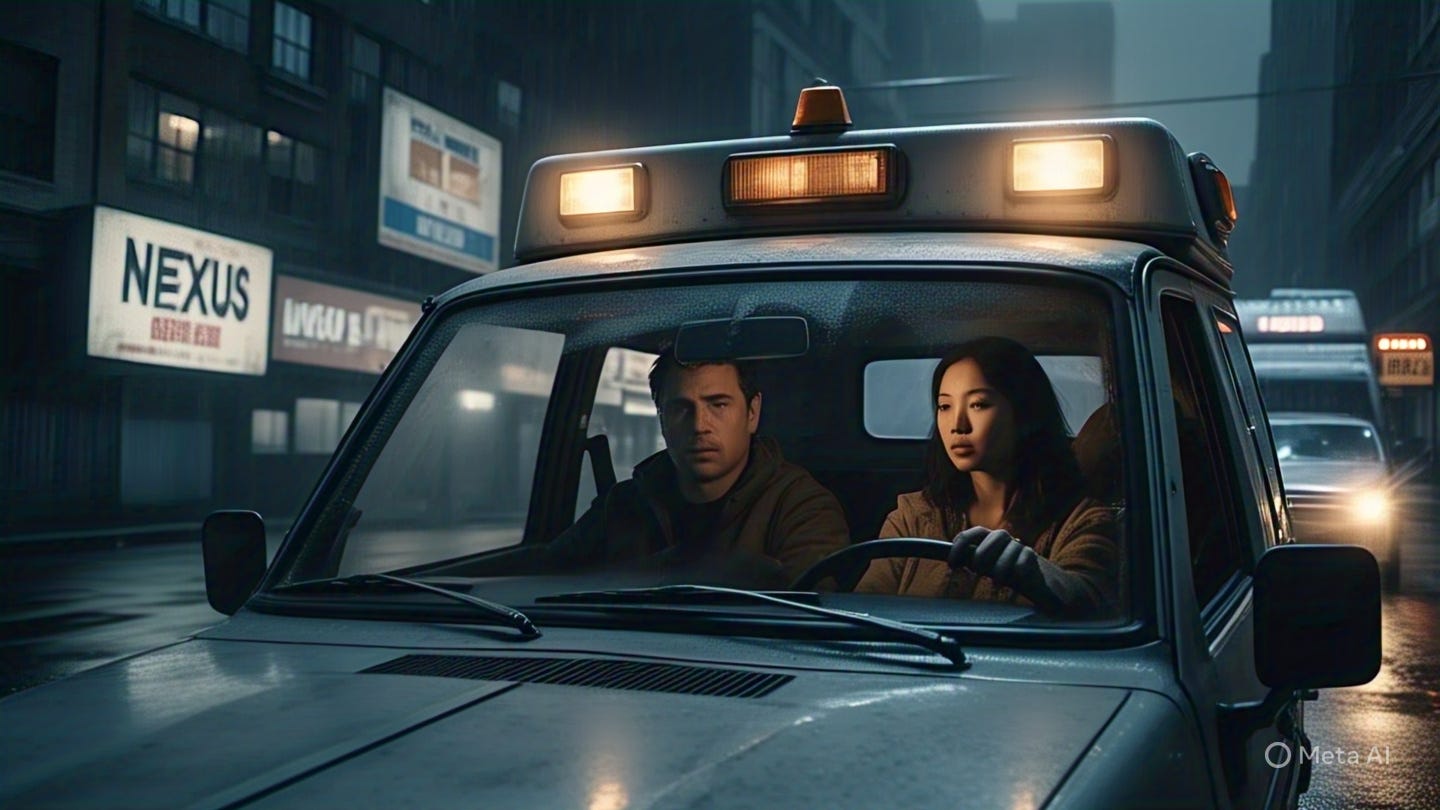
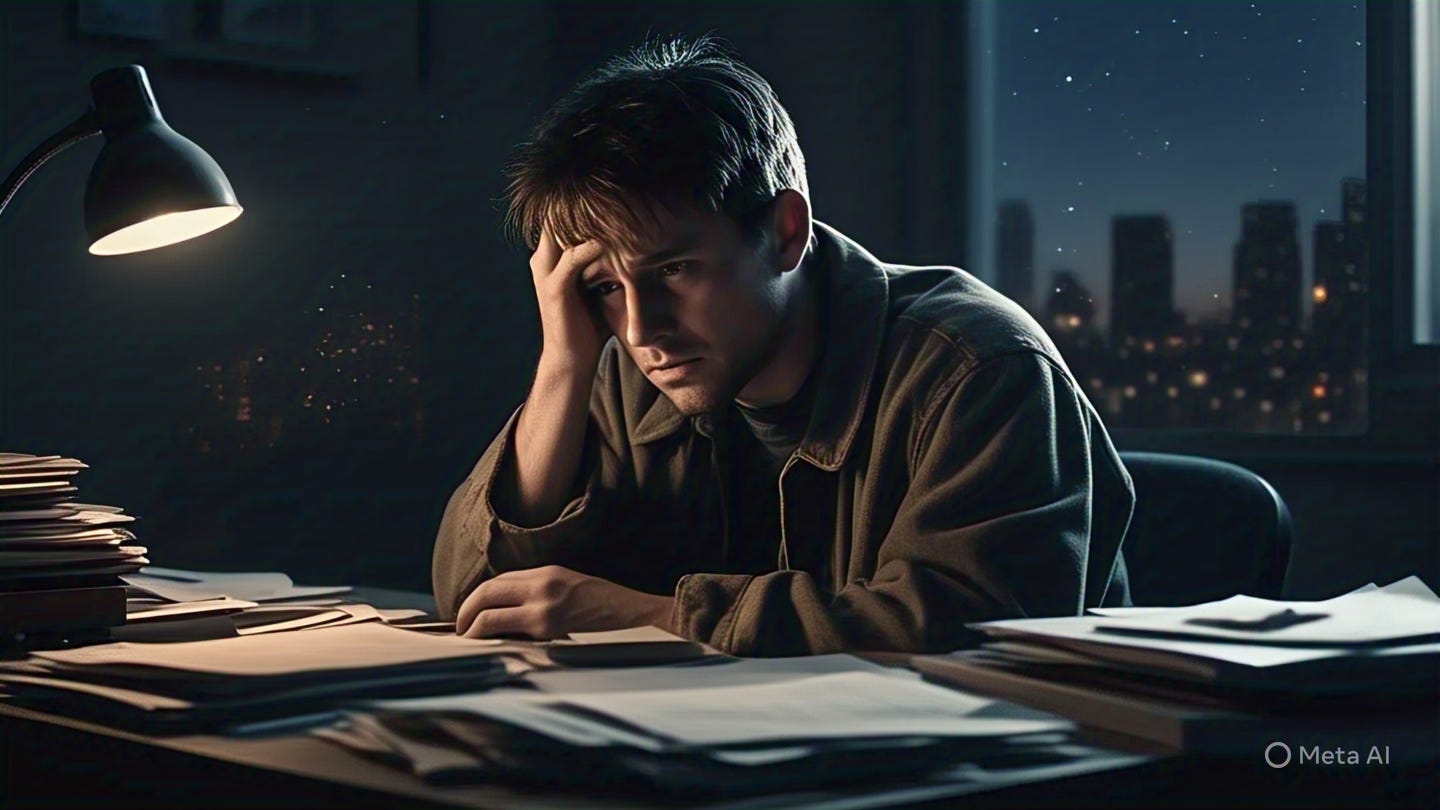
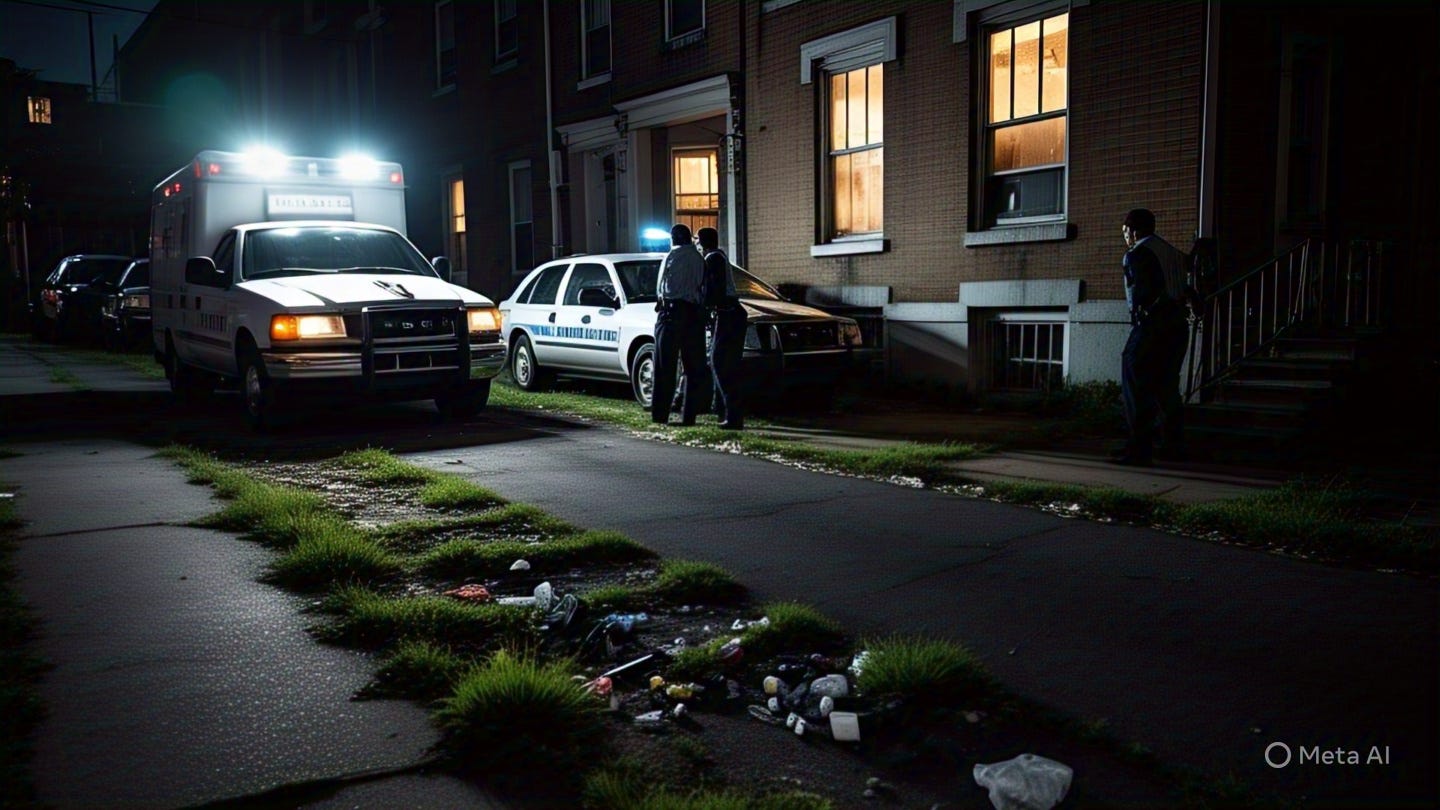
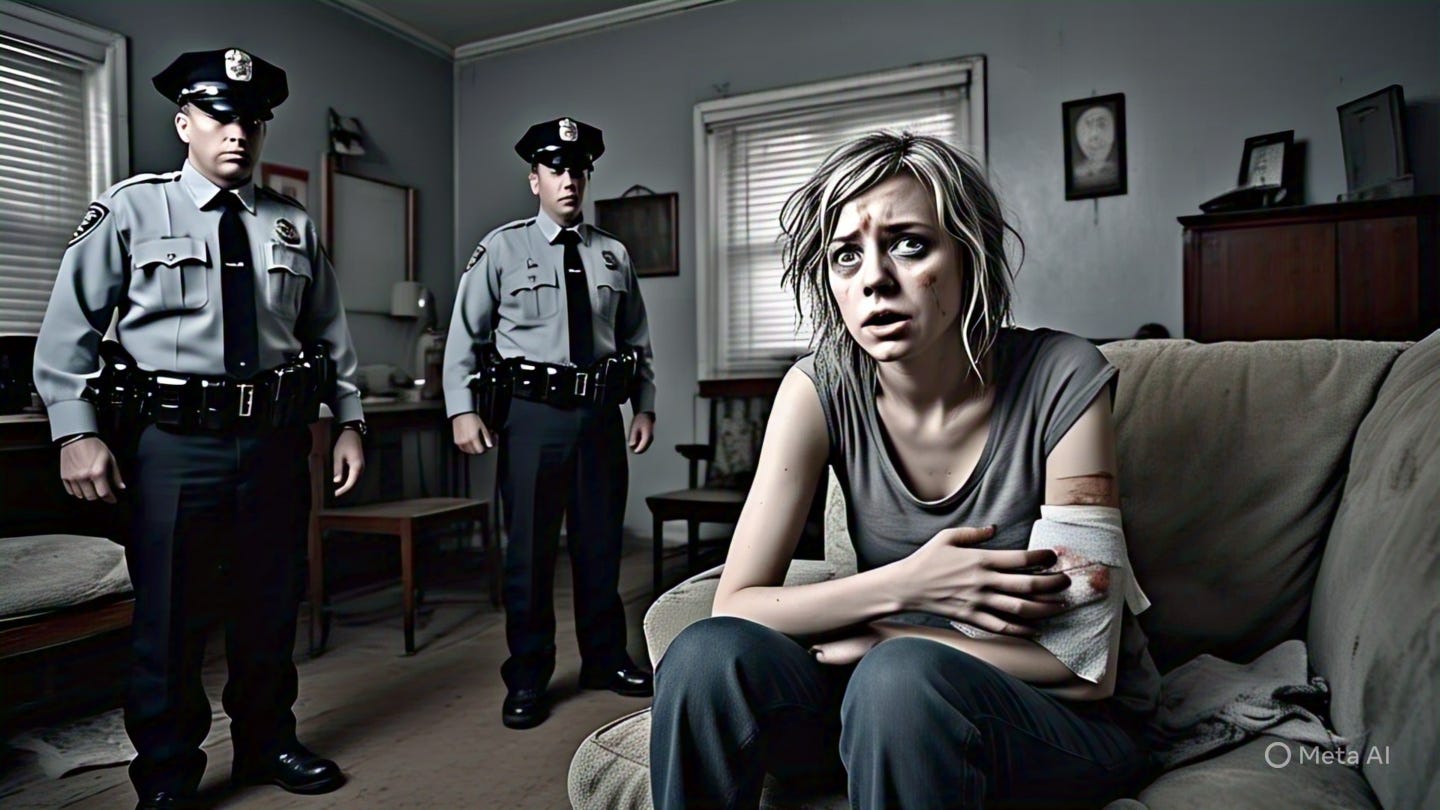
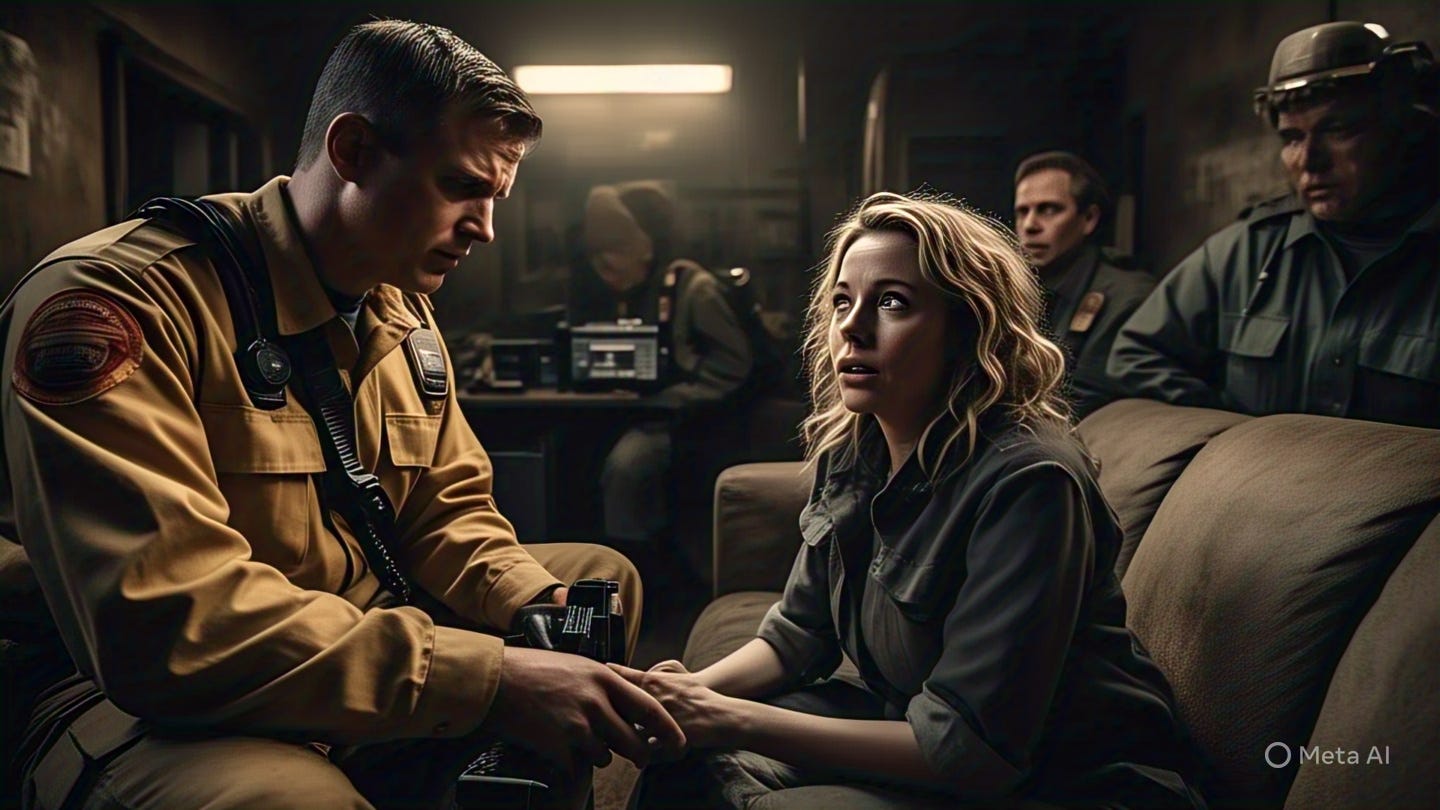
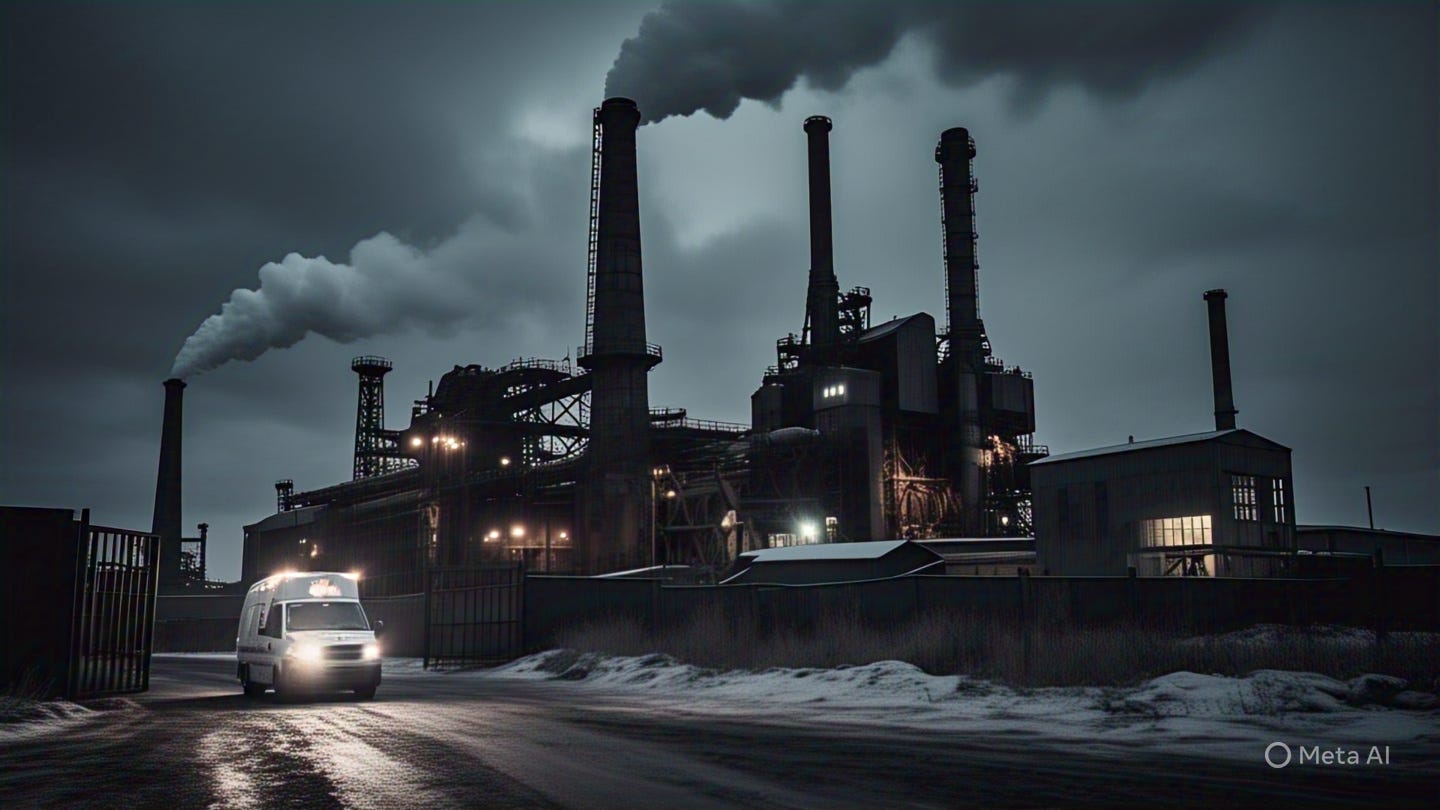
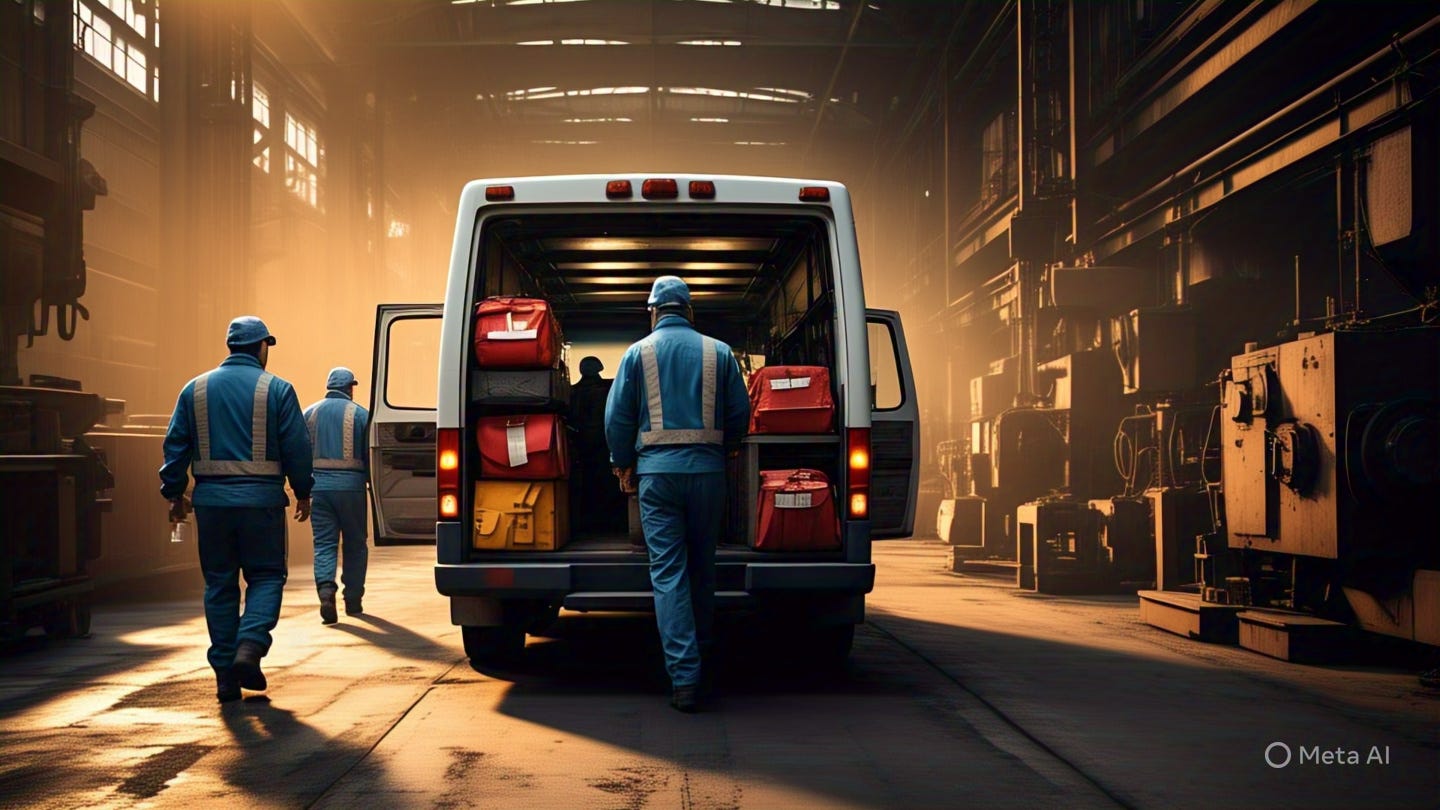
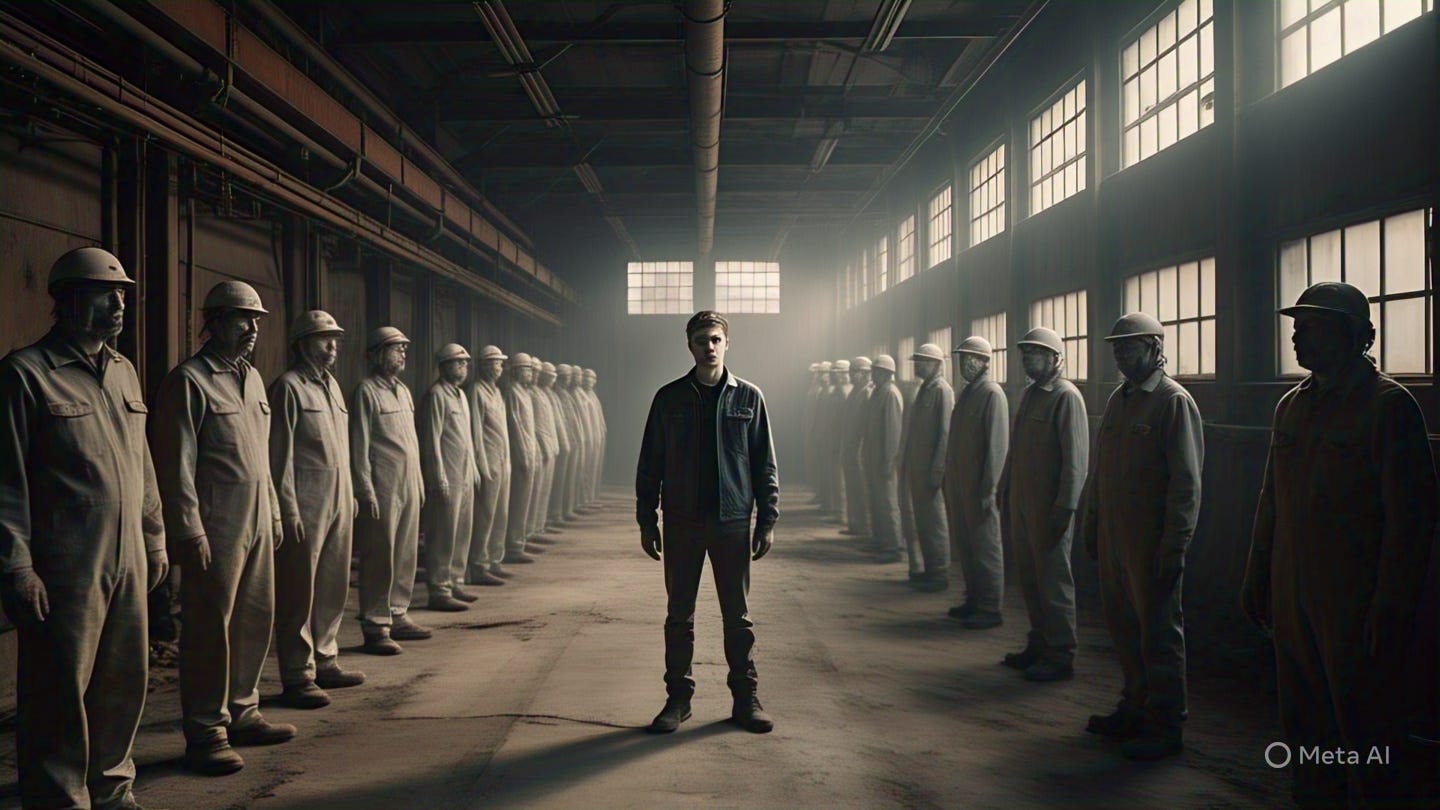
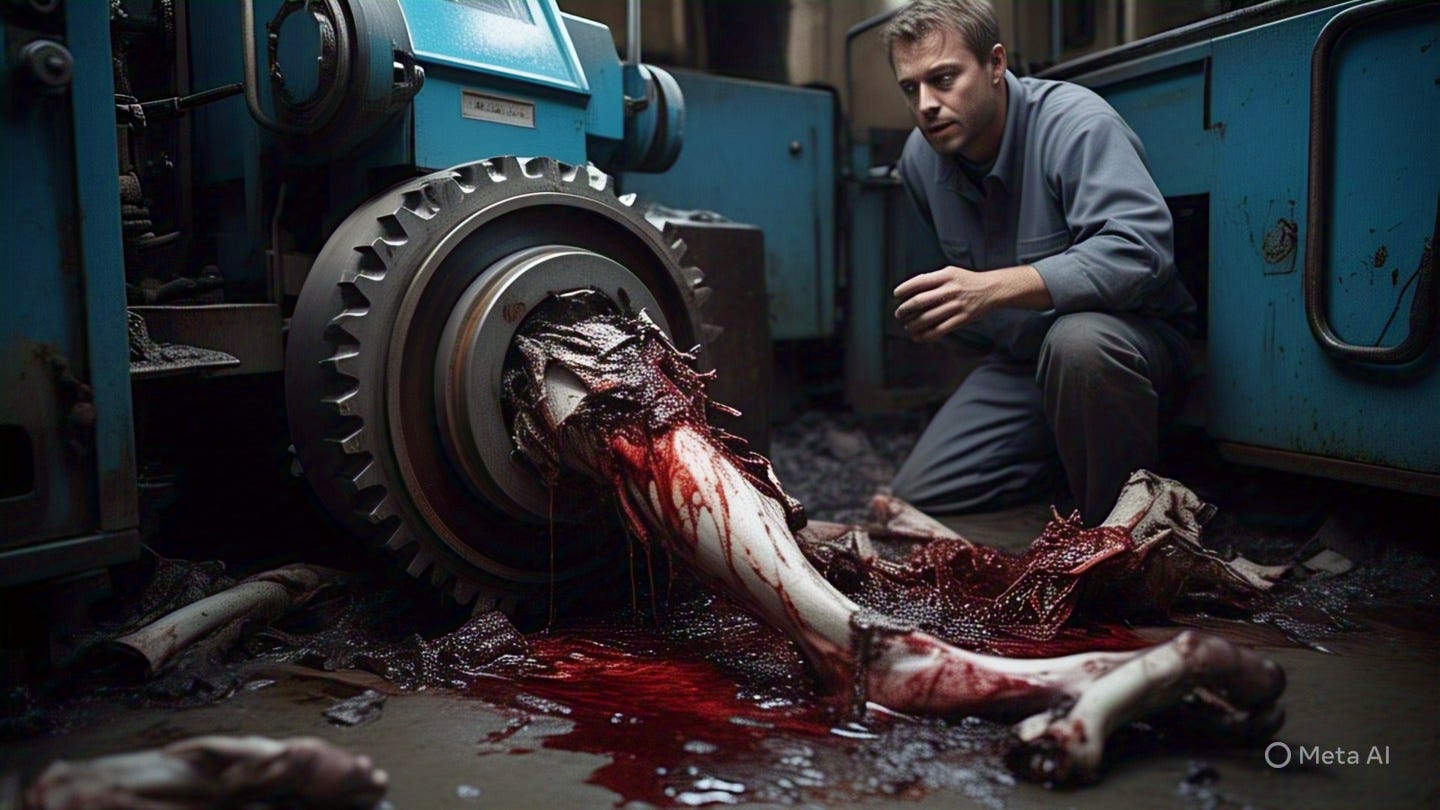
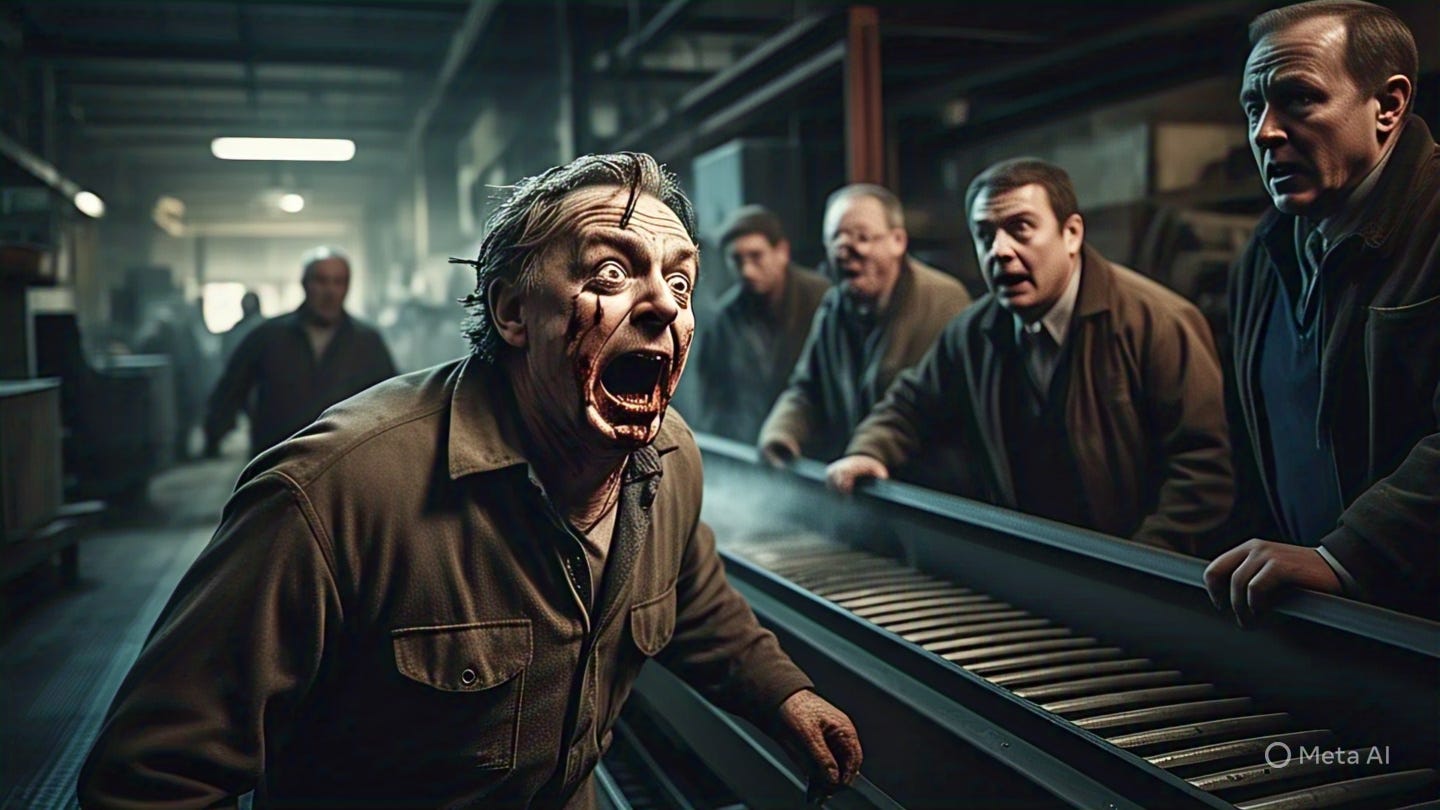



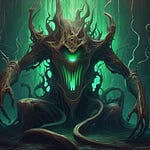




Share this post